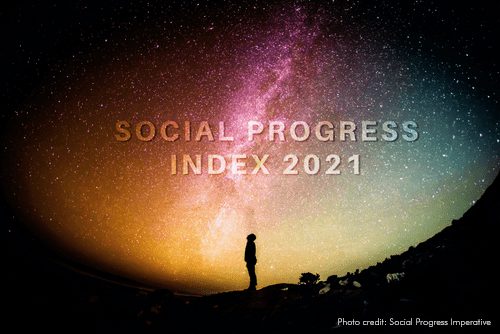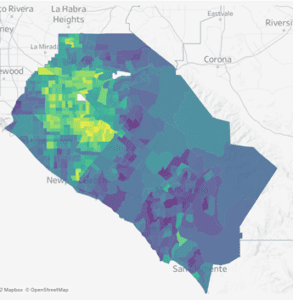
Jan 31, 2022 Social Progress Index
WellBeing News has carried several stories about global happiness (e.g., World Happiness Report), subjective well-being, and happiness research centers. Happiness (and subjective well-being) research is booming, but these are not the only ways to measure global well-being. The Social Progress Imperative is a US-based non-profit that assesses international, national, and local progress using non-financial measures. The organization is best known for the Social Progress Index, which measures societal well-being using three dimensions. These dimensions include – basic human needs (e.g., nutrition, shelter, clean water), foundations of wellbeing (e.g., access to knowledge & information, wellness, environmental quality), and opportunity (e.g., personal rights & choice, inclusiveness, and access to advanced education). In all, the Index includes 53 social and environmental indicators to determine “what life is like for everyday people.” The Social Progress Index (Index) measures outcomes rather than inputs but does not include individual happiness, life satisfaction, or income and investment measures. It is, therefore, a different measure than the happiness/subjective well-being reports described in previous newsletters.
Despite these differences, the top five nations in the 2021 global Index are the four Scandinavian countries (who also lead the rankings of World Happiness Report) and New Zealand. Japan (at number 13) is the leader of the Asian countries, closely followed by South Korea at number 17. Canada (number 6) and the USA (number 24) are the North American countries, while Chile (number 34), Costa Rica (number 37), and Uruguay (number 38) lead the Latin American contingent. European countries dominate the top of the Index. One of the main criticisms of the Index is that it is heavily based on Western values. Tunisia (at number 58) is the leading African country, followed by South Africa at number 80. The bottom five countries (164 to 168) are Somalia, Eritrea, Chad, the Central African Republic, and South Sudan.
Despite the various criticisms, the Index is an interesting and helpful starting point to help policymakers move away from economic measures that accentuate financial growth and per capita income and expenditure. Michael Green, an economist who is the current Executive Director of the Social Progress Imperative and one of the organization’s founders, gave a much-watched TED talk (viewed 1.7 million times) in September 2018. In the talk, he connected measures in the Social Progress Index to the UN’s Sustainable Development Goals and indicated that, as of 2018, the SDGs were at 69.1 on a 100-point scale.
Green featured some critical progress in the SDGs identified by the Index but indicated that, according to the trends, the Sustainable Development Goals would not be reached until 2094 (the UN set 2030 as the target date to achieve the SDGs). On SDGs 1 (no poverty), 5 (gender equality), 10 (reduced inequality), 11 (sustainable cities), and 16 (peace and justice), the world is moving backward. (Surprisingly, Green did not also include the SDGs for climate action (13), life below water (14), and life on land (15) in the goals that are moving backward.)
 One of the exciting features of the Index is that corporations and local communities are picking it up to help drive progress towards sustainability and justice. For example, the European Union uses the Index to help inform policy decisions. In the United States of America, cities and counties have also been using the Index to identify service and community well-being gaps. For example, Orange County, California, used the Index to identify areas in the county that spotlighted social and health disparities (yellow and green spaces in the map to the right) and then developed specific outreach measures to provide Covid vaccines to those areas.
One of the exciting features of the Index is that corporations and local communities are picking it up to help drive progress towards sustainability and justice. For example, the European Union uses the Index to help inform policy decisions. In the United States of America, cities and counties have also been using the Index to identify service and community well-being gaps. For example, Orange County, California, used the Index to identify areas in the county that spotlighted social and health disparities (yellow and green spaces in the map to the right) and then developed specific outreach measures to provide Covid vaccines to those areas.
While we still do not have a perfect measure to determine human well-being in different locations, several robust tools developed in the last decade allow policymakers to move away from simple (and simplistic) economic measures of human well-being.


